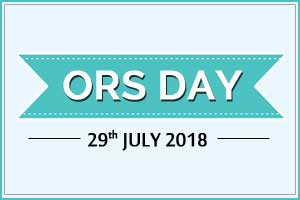- Home
- Editorial
- News
- Practice Guidelines
- Anesthesiology Guidelines
- Cancer Guidelines
- Cardiac Sciences Guidelines
- Critical Care Guidelines
- Dentistry Guidelines
- Dermatology Guidelines
- Diabetes and Endo Guidelines
- Diagnostics Guidelines
- ENT Guidelines
- Featured Practice Guidelines
- Gastroenterology Guidelines
- Geriatrics Guidelines
- Medicine Guidelines
- Nephrology Guidelines
- Neurosciences Guidelines
- Obs and Gynae Guidelines
- Ophthalmology Guidelines
- Orthopaedics Guidelines
- Paediatrics Guidelines
- Psychiatry Guidelines
- Pulmonology Guidelines
- Radiology Guidelines
- Surgery Guidelines
- Urology Guidelines
ORS Day Special: Importance of ORS in Adults

The biggest singular innovation of the 20th century which takes the credit, saving a maximum number of lives, especially in developing countries has indeed been the development of Oral Rehydration Therapy.
In a country like India where Diarrhoea, frequently caused by poor sanitation and hygiene, can have serious, even deadly results, typically as a result of diarrhea-related dehydration, ORAL Rehydration Solution or ORS has indeed emerged as an easy and cost-effective of early intervention saving countless lives.
While ORS is prominently promoted as the first line of treatment in case of dehydration and Diarrhoea in children, its importance in case of adults cannot be undermined.
Elderly adults with co-morbidities are supposedly as vulnerable to dehydration as children, therefore ORS therapy is equally important in all such cases. This alarmingly simple intervention has helped a lot of compromised adults and those with severe co-morbidities.
“ORS should be given in any case of dehydration caused by either diarrhea or heat stroke or any condition causing excessive fluid loss from the body,” advised Dr. Ajay Kumar, Senior Gastroenterologist and Chairman, Fortis Escorts Liver& Digestive Diseases Institute. As per WHO, diarrhea is defined as the passage of three or more loose or liquid stool per day. It is usually the symptom of gastrointestinal infection.
Regarding the ideal dosage of ORS, he said," Although, it can be given as much as patients can take. But after each episode of loose motion 200-300 ml ORS is sufficient”
Highlighting the importance of ORS in Geriatric Patients, Dr. Bobby Grewal, General Secretary, Delhi Medical Association and a Senior Specialist in Elderly Care said “ ORS acts as a boon in case of Electrolyte Imbalance in adults, especially the geriatric population. Older people, many of whom take a combination of medicines including Diuretics are prone to electrolyte imbalance, particularly low sodium with sweating. This electrolyte imbalance can even prove life-threatening to the elderly who have certain co-morbidities. It is important that such patients keep ORS in handy especially in sweaty seasons like this one.”
Unfortunately, despite the widespread known benefits of ORS, the Global ORS coverage rates are still less than 50% and on the eve of ORS day which is celebrated every year on 29th July, efforts must be made to improve coverage and create more awareness to highlight the importance of the use of ORS as a cost-effective method of health intervention even in adults.
Some Recent Advances in ORS
With recent advancements new lower-osmolarity ORS have been recommended by WHO and UNICEF which have reduced concentrations of sodium and glucose and is associated with less vomiting, less stool output, lesser chance of hypernatremia, as well as a reduced need for intravenous infusions in comparison with standard ORS. This formulation is recommended irrespective of age and the type of diarrhea including cholera.
“ORS is now also available in ready to drink form that has the convenience of storage as well as comes pre-mixed making it easier for patients, particularly elderly patient to consume and carry,” said Dr. Grewal.

Disclaimer: This site is primarily intended for healthcare professionals. Any content/information on this website does not replace the advice of medical and/or health professionals and should not be construed as medical/diagnostic advice/endorsement or prescription. Use of this site is subject to our terms of use, privacy policy, advertisement policy. © 2020 Minerva Medical Treatment Pvt Ltd